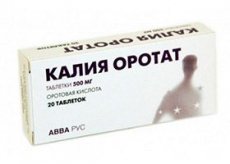Medical expert of the article
New publications
Preparations
Potassium orotate
Last reviewed: 03.07.2025

All iLive content is medically reviewed or fact checked to ensure as much factual accuracy as possible.
We have strict sourcing guidelines and only link to reputable media sites, academic research institutions and, whenever possible, medically peer reviewed studies. Note that the numbers in parentheses ([1], [2], etc.) are clickable links to these studies.
If you feel that any of our content is inaccurate, out-of-date, or otherwise questionable, please select it and press Ctrl + Enter.

Indications Potassium orotate
According to the instructions, the indication for use of the drug is:
- Myocardial infarction.
- Anemia.
- Heart failure, in chronic form (stages II and III).
- Bacterial or drug intoxication.
- Atrial fibrillation.
- Progression of muscle tissue dystrophy.
- Toxic damage to the liver and biliary tract (except ascitic syndrome in liver cirrhosis).
- Dystrophic changes in the myocardium.
- Extrasystole.
- Dermatosis.
- Dystrophies in children of alimentary and infectious-alimentary genesis.
- The period of convalescence after infectious diseases, during high physical exertion.
- Treatment of edema during pregnancy, normalization of potassium balance.
 [ 7 ]
[ 7 ]
Release form
The tablets are round and cylindrical, bounded by two planes with truncated edges. One of the planes has a dividing line.
Packaging: 10 tablets in one blister. Cardboard packaging may have 1, 2, 3 or 6 blisters.
The drug is produced in quantities of 20–30 tablets and in polymer bottles.
The active ingredient of the drug is potassium orotate, the concentration in one tablet is 500 mg.
Additional substances: stearic acid, potato starch, medical gelatin and lactose.
 [ 8 ]
[ 8 ]
Pharmacodynamics
Orotic acid is a drug with anabolic nonsteroidal action.
The drug normalizes the metabolism of lipids and proteins, being a precursor of ribonucleotides thymine, uracil and cytosine. Its involvement in carbohydrate metabolism is due to the effect on galactose metabolism. Activates the synthesis of nucleic acids.
Potassium orotate has a regenerating and reparative effect. It has a diuretic effect.
Potassium orotate promotes better tolerance of cardiac glycosides and activates the synthesis of albumins in the liver.
Pharmacokinetics
The level of absorption of the drug by the mucous membrane of the digestive tract is quite low and is no more than a tenth of the total volume of the drug taken.
In the liver, the drug is metabolized into one of its metabolites - orotidine-5-phosphate.
The body excretes Potassium orotate through the kidneys along with urine.
Dosing and administration
The drug is recommended to be taken orally one hour before meals or four hours after meals. Dosage: 250-500 mg twice or three times a day. Duration of treatment is from 20 to 40 days.
If necessary, the daily amount of Potassium Orotate taken can be increased to 3 g, which corresponds to 6 tablets.
If therapeutic efficacy is not achieved and repeated treatment is required, it can be started no earlier than a month after the end of the first course.
For children, the daily dose of the drug is calculated using the formula: 10-20 mg per kilogram of the child's weight. The resulting amount is divided into 2-3 doses.
Pregnant women are recommended to take 1 tablet twice or three times a day. Monitoring the volume of fluid excreted by the kidneys is mandatory.
Cardiology patients are recommended to administer Potassium Orotate while taking magnesium. Potassium Orotate is not prescribed as a potassium-containing drug in potassium replacement therapy.
Use Potassium orotate during pregnancy
The drug can be used during pregnancy. It is prescribed to pregnant women as a means of replenishing the deficiency of potassium in the body.
Contraindications
There are also contraindications to the use of Potassium Orotate:
- High physical activity.
- Ascites in liver cirrhosis.
- Nephrolithiasis.
- Chronic renal dysfunction.
- Individual intolerance to the components of the drug, including orotic acid.
Side effects Potassium orotate
Interactions with other drugs
When taking Potassium orotate together with tetracycline group drugs, the absorption level of the latter deteriorates.
The toxicity of cardiac glycosides decreases. But the mutual influence of Potassium orotate and folic acid, magnesium or cyanocobalamin drugs increases the effectiveness of both.
When taken simultaneously with oral contraceptives, glucocorticosteroid drugs, insulin, diuretics or muscle relaxants, the pharmacological characteristics of Potassium orotate deteriorate.
Sodium fluoride and iron drugs are absorbed worse by the gastrointestinal mucosa when taken together with Potassium orotate.
Storage conditions
Storage conditions for the drug Potassium orotate consist of a number of points:
- The medicine should be kept in a dry place, protected from direct sunlight.
- The room temperature should not exceed +25 degrees above zero.
- The medicine must be stored in places that are inaccessible to teenagers and small children.
Attention!
To simplify the perception of information, this instruction for use of the drug "Potassium orotate" translated and presented in a special form on the basis of the official instructions for medical use of the drug. Before use read the annotation that came directly to medicines.
Description provided for informational purposes and is not a guide to self-healing. The need for this drug, the purpose of the treatment regimen, methods and dose of the drug is determined solely by the attending physician. Self-medication is dangerous for your health.

